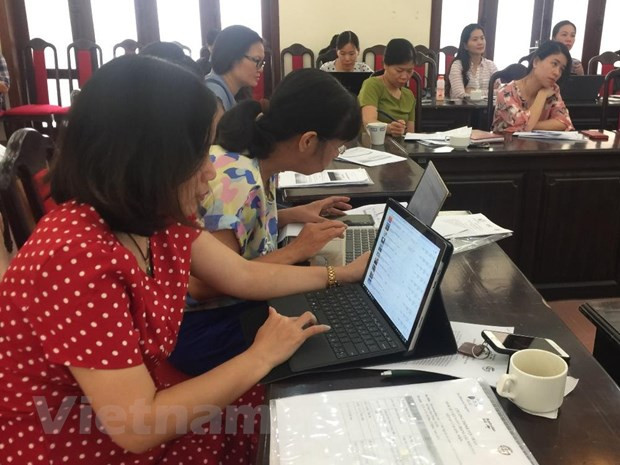 Compared to the period of 2008-2009, Vietnam now has more experience and is calmer to cope with the adverse impacts from world economic developments (Photo: Vietnam +)
Compared to the period of 2008-2009, Vietnam now has more experience and is calmer to cope with the adverse impacts from world economic developments (Photo: Vietnam +)
Hanoi (VNA) - “Halfway through the year, the international and domestic economic context has many uncertainties, creating significant challenges in fulfilling socio-economic development goals. However, the administration of policies and economic reforms of the country are considered as bright spots contributing to the growth and macroeconomic stability. ”
Mr. Nguyen Anh Duong, Head of the General Research Department, Central Institute for Economic Management (CIEM) said at the workshop “Vietnam economy in the first 6 months of 2019: Results and Perspectives,” organized by CIEM in collaboration with the Australian Program to Support Vietnam's Economic Reform (Aus4Reform) on July 12th.
Meeting the growth target
In the second quarter, the trend of financial tightening in some developed economies was quickly reversed.
Meanwhile in Vietnam, although the results of economic growth in the first quarter were relatively high, the Prime Minister drastically directed to focus on removing obstacles for business and production since the beginning of the second quarter. Requirements for proactive monitoring, updating and forecasting developments from outside have been carried out more often.
As a result, GDP growth in Q2 reached 6.71 percent, down compared to Q1 (6.82 percent). Generally, in 6 months, GDP increased by 6.76 percent and was lower than the increase in the first half of 2018 but still considered higher than the same period in 2011-2017. This result is not too far from the growth target for the whole year 2019 (6.8 percent -7.0 percent).
“Vietnam's economic growth is still high compared to other countries in the region. The domestic economy continued to expand its growth, but the potential GDP growth rate remained in the downtrend. This reflects concerns about the quality of growth which has not been consolidated,” Mr. Duong said.
 Workshop on "Vietnam's economy in the first 6 months of 2019: Results and Perspectives" (Photo: Vietnam +)
Workshop on "Vietnam's economy in the first 6 months of 2019: Results and Perspectives" (Photo: Vietnam +)
Calmly deal with external instability
In its report, CIEM addresses the US-China trade war and said that tensions are still ongoing and extremely unpredictable. Experts from CIEM make recommendations, related developments and dynamics from the US - China sides have direct and indirect effects on the world economy.
“There are many scenarios and uncertainties that this trade war may occur in the future, leading to different reactions of other countries. Vietnam is a small economy and open to integration so it is difficult to avoid the impacts, it is essential to implement a suitable policy,” Mr. Duong said.
However, Mr. Duong highly appreciated Vietnam's resilience. According to him, the Government, ministries and agencies have regularly monitored, assessed and forecasted the situation of the world, thereby updating and finalizing the scenarios. Compared to the period of 2008-2009, Vietnam now has more experience and is better at coping with adverse impacts from world economic developments.
According to Dr. Nguyen Dinh Cung, Head of CIEM, in the context of the world economy tends to decline, Vietnam's economy in the first six months of 2019 still achieved a positive growth rate. Indicators have been achieved at a relatively high level, which proves that domestic reforms have had a positive impact in mobilising resources to compensate for negative impacts from outside.
However, macroeconomic developments in the last six months of the year may be influenced by some factors, such as the risk of recession of the world economy and trade tension in the region that has not cooled down, especially the uncertain variables that US-China trade war that could happen in the future. As a small economy in its opening and deep integration, it is hard for Vietnam to avoid the effects of this war, and therefore making a policy choice to respond is necessary.
Therefore, maintaining the momentum of growth on the set targets requires extremely important reform efforts. Dr. Cung said that in the current context, Vietnam's growth momentum would depend greatly on reforms, especially reforms on business environment improvement, support and development of private economic sector, reform of State-owned enterprises, removing barriers to mobilise more capital and disbursing more public investment capital.
On that basis, CIEM forecasts that Vietnam's economic growth in 2019 could reach 6.82 percent. Export growth for the whole year is forecast at 8.02 percent. Trade surplus is forecast at 0.8 billion USD. Average inflation in 2019 is predicted at 3.38 percent.
In addition, the CIEM report also has a number of warnings in the second half of the year, specifically; macroeconomic developments may be affected by a number of factors on the risk of recession in the world economy. In addition, the possibility of Vietnam's exports may encounter many trade defense lawsuits, tax evasion investigations, origin fraud./.
























